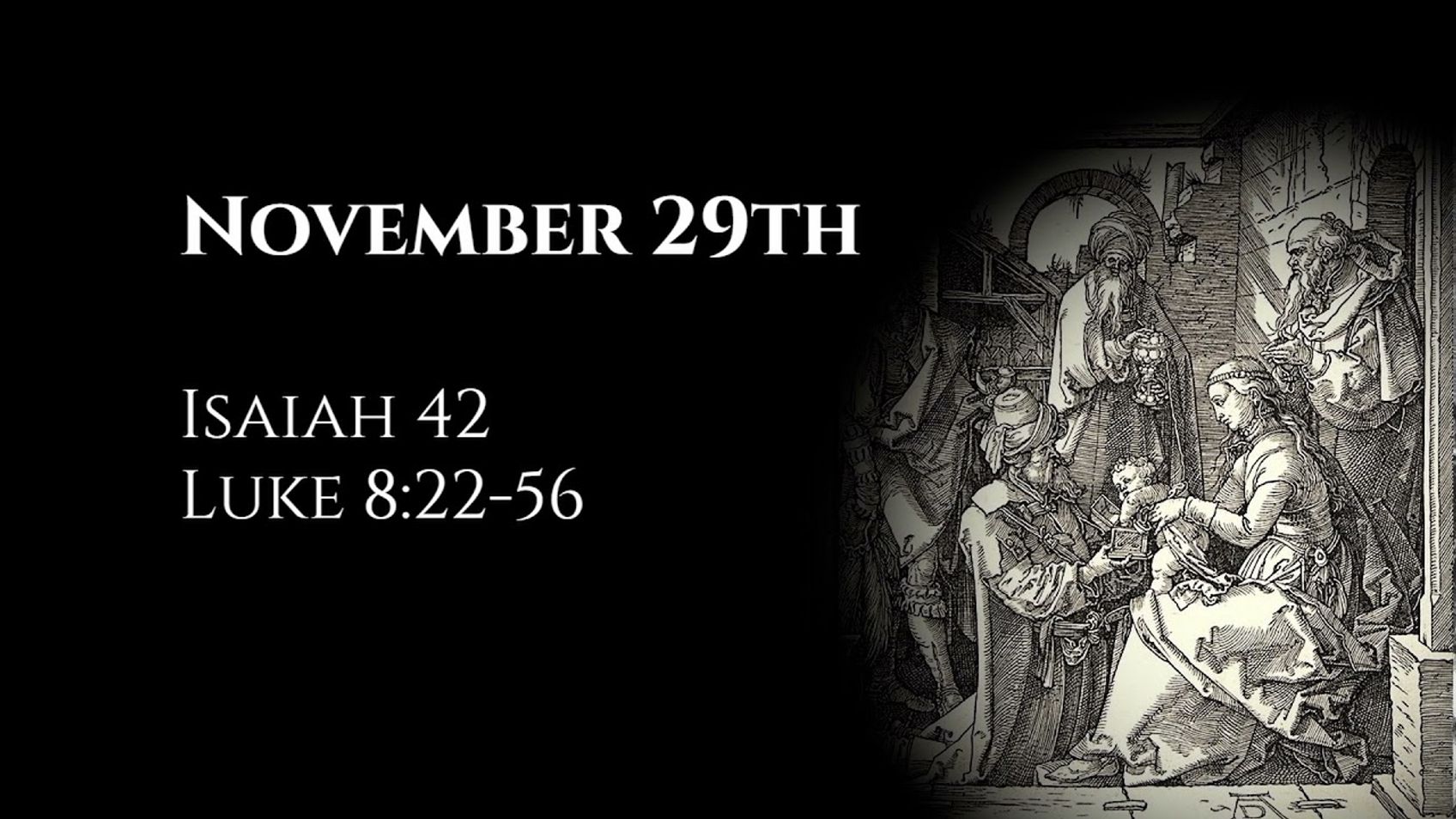November 29th: Isaiah 42 & Luke 8:22-56
November 28, 2021

Alastair Roberts
Behold, my Servant. Calming the storm, delivering the Gerasene demoniac, and healing the woman with the issue of blood and Jairus' daughter.
My reflections are searchable by Bible chapter here: https://audio.alastairadversaria.com/explore/.
If you are interested in supporting this project, please consider supporting my work on Patreon (https://www.patreon.com/zugzwanged), using my PayPal account (https://bit.ly/2RLaUcB), or buying books for my research on Amazon (https://www.amazon.co.uk/hz/wishlist/ls/36WVSWCK4X33O?ref_=wl_share).
You can also listen to the audio of these episodes on iTunes: https://itunes.apple.com/gb/podcast/alastairs-adversaria/id1416351035?mt=2.
More From Alastair Roberts

The Final Stretch and an Upcoming Course on the Patriarchs!
Alastair Roberts
November 29, 2021
Sign up for Davenant programmes and courses here: https://davenantinstitute.org/davenant-hall (20% off on Cyber Monday!).
If you are interested in su
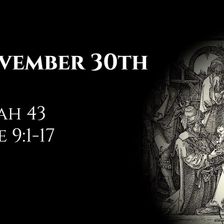
November 30th: Isaiah 43 & Luke 9:1-17
Alastair Roberts
November 29, 2021
I have called you by name, you are mine. Sending out the Twelve and feeding the five thousand.
My reflections are searchable by Bible chapter here: h
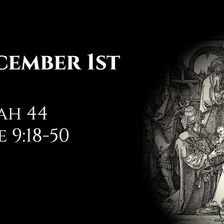
December 1st: Isaiah 44 & Luke 9:18-50
Alastair Roberts
November 30, 2021
Demystifying the idols. The Transfiguration.
My reflections are searchable by Bible chapter here: https://audio.alastairadversaria.com/explore/.
If
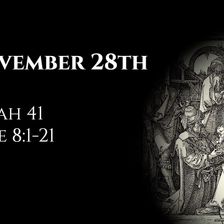
November 28th: Isaiah 41 & Luke 8:1-21
Alastair Roberts
November 27, 2021
Fear not, for I am with you. The Parable of the Sower.
My reflections are searchable by Bible chapter here: https://audio.alastairadversaria.com/expl
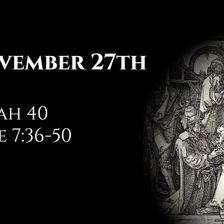
November 27th: Isaiah 40 & Luke 7:36-50
Alastair Roberts
November 26, 2021
Comfort, comfort my people. A sinful woman anoints Jesus' feet.
My reflections are searchable by Bible chapter here: https://audio.alastairadversaria
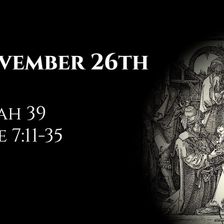
November 26th: Isaiah 39 & Luke 7:11-35
Alastair Roberts
November 25, 2021
The visit of the Babylonian envoys. Messengers from John the Baptist.
My reflections are searchable by Bible chapter here: https://audio.alastairadve
More on OpenTheo

Does Open-Mindedness Require Studying Other Religions Before Becoming a Christian?
#STRask
February 9, 2026
Questions about the claim that if Christians really want to be open-minded, they need to read and study other religions before committing to Christian

Is It Possible There’s a Being That’s Greater Than God?
#STRask
February 5, 2026
Questions about whether it’s possible there’s a being that’s greater than God and that’s outside of God’s comprehension and omniscience, and how to ex

Conservatism and Religious Freedom with John Wilsey
Life and Books and Everything
October 27, 2025
What is conservatism? And why does it go hand in hand with religious freedom? How should we think about the American experiment of ordered liberty? Ha

Is It a Sin to Feel Let Down by God?
#STRask
November 6, 2025
Questions about whether it’s a sin to feel let down by God and whether it would be easier to have a personal relationship with a rock than with a God

Life and Ministry in Charlotte and in the SBC with Clint Pressley
Life and Books and Everything
December 15, 2025
In a rare cultural anomaly that may never be repeated in our lifetimes, the current SBC President and current PCA Moderator live in the same neighborh

Could the Writers of Scripture Have Been Influenced by Their Fallen Nature?
#STRask
October 23, 2025
Questions about whether or not it’s reasonable to worry that some of our current doctrines were influenced by the fallen nature of the apostles, and h

How Do I Determine Which Topics at Work Are Worth Commenting On?
#STRask
January 5, 2026
Questions about how to determine which topics at work are worth commenting on, and a good way to respond when you’re in a group Bible study and hear e

Can You Recommend Good Books with More In-Depth Information and Ideas?
#STRask
January 22, 2026
Questions about good books on Christian apologetics, philosophy, and theology with more in-depth information and ideas, and resources to help an intel

What Is the Role of the Holy Spirit in Our Lives if He Doesn’t Give Us Instructions?
#STRask
February 23, 2026
Questions about the role of the Holy Spirit in our lives, advice for someone who believes in God intellectually but struggles to understand how to hav

Sense, Sensibility, and Adam Smith with Jan Van Vliet
Life and Books and Everything
February 16, 2026
This year is a special anniversary for the United States as Americans celebrate 250 years of independence. But 1776 was an important year in more ways

The Resurrection Standoff: Licona vs. Ehrman on the Unbelievable Podcast
Risen Jesus
October 22, 2025
This episode is taken from the Unbelievable podcast with Justin Brierly in 2011 when Dr. Bart Ehrman and Dr. Michael Licona address the question: Is t

Why Does the Bible Teach You How to Be a Proper Slave Owner?
#STRask
November 13, 2025
Question about why it seems like the Bible teaches you how to be a proper slave owner rather than than saying, “Stop it. Give them freedom.”
* It s

When I Can’t Stop Thinking About Something, Is That God Speaking?
#STRask
December 1, 2025
Questions about whether having a recurring thought is an indication God is speaking to you, what to say to someone who says they sinned because “God t

Keri Ingraham: School Choice and Education Reform
Knight & Rose Show
January 24, 2026
Wintery Knight and guest host Bonnie welcome Dr. Keri Ingraham to discuss school choice and education reform. They discuss the public school monopoly'

Prove to Me That Jesus Is Not a Created Being
#STRask
January 26, 2026
Questions about why we should think Jesus is not a created being, and what it means to say God became fully human if part of being human means not bei
